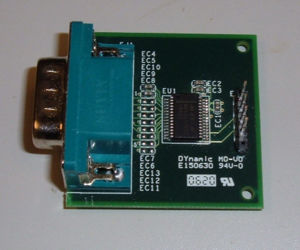Serial adapters: Difference between revisions
No edit summary |
mNo edit summary |
||
| Line 1: | Line 1: | ||
OLPC has 2 different serial adapters for getting serial output from the laptop. |
OLPC has 2 different serial adapters for getting serial output from the laptop. |
||
The original adapter that came with the ATest boards |
The original adapter that came with the ATest boards [[Image:serial_adapter.jpg|thumb|Original Serial Adapter]] and the new universal adapter [pic_of_new_adapter]. |
||
The first adapter is very simple and only does TTL<->RS232. |
The first adapter is very simple and only does TTL<->RS232. |
||
Revision as of 04:45, 4 October 2007
OLPC has 2 different serial adapters for getting serial output from the laptop.
The original adapter that came with the ATest boards
and the new universal adapter [pic_of_new_adapter].
The first adapter is very simple and only does TTL<->RS232.
The new adapters are able to do TTL<->RS232, TTL<->USB, and RS232<->USB. In the RS232 modes they are able to work with both straight and NULL modem cables. Because of this they are a bit more complicated than the original adapters.
This complexity is in the form of 2 jumper blocks on the adapters. Blocks J4 and J6.
J4: Mode select block
J4 selects between the 3 modes of operation.
Mode 1: TTL<->USB
- Jumper 1&2, 5&6
Mode 2: RS232<->USB
- Jumper 3&4, 7&8
Mode 3: TTL<->RS232
- Jumper 2&4, 6&8
J6: Null Modem block
In the RS232 modes 2 & 3, J6 will swap the TX and RX lines. Normally changing these jumpers is not necessary.
- RS232 NULL Modem: 1&2, 5&6
- RS232 Normal: 3&4, 7&8
To make the adapter appear a like a serial port you would find on a PC you would use normal wiring. Connection between the adapter and the PC would use a NULL modem or crossover cable.
If you are using a serial cable that is wired to be straight thru then you would use NULL modem wiring.
If you are using Mode 1 then the settings for J6 do not make any difference because the DB9 is not used.
